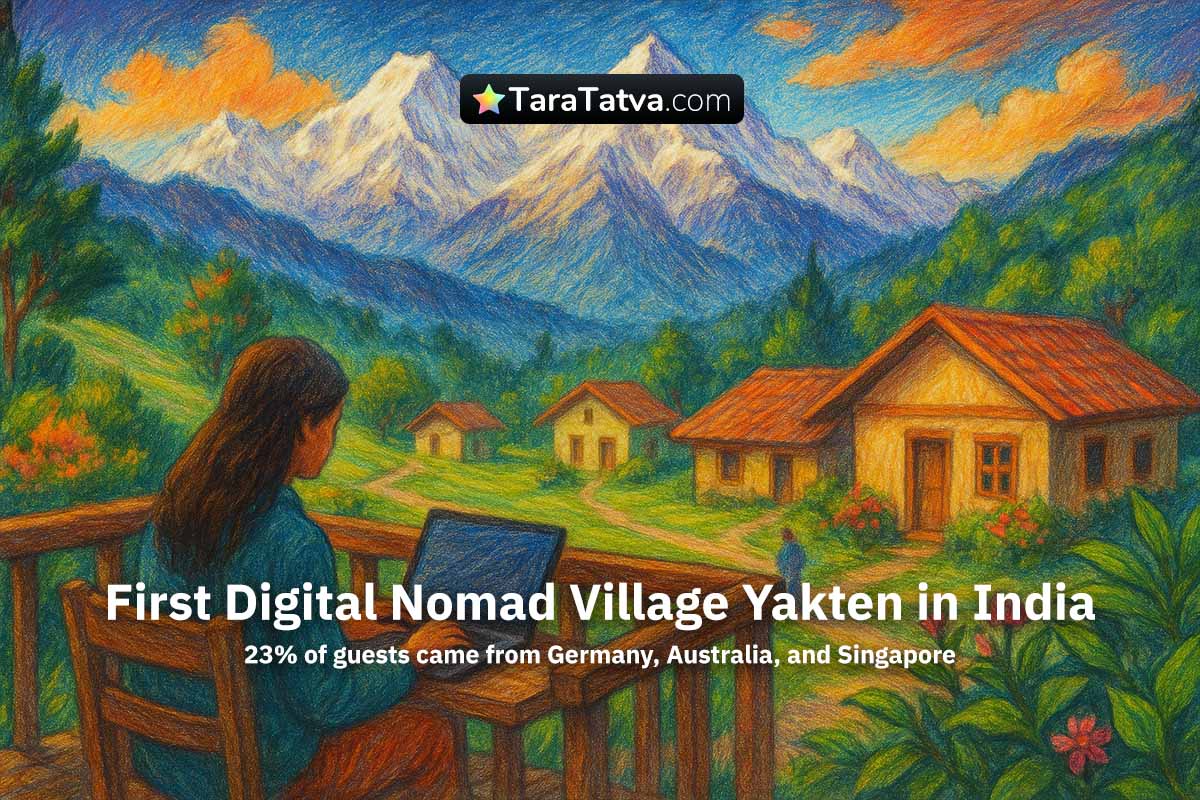First Digital Nomad Village Yakten in India
First Digital Nomad Village Yakten, Sikkim, India is redefining work-life vibes with India’s first digital nomad village—where Wi-Fi meets waterfalls and real stories await.
What’s the story
India just marked a powerful milestone in remote work culture. In July 2025, the village of Yakten in Sikkim’s Pakyong district was declared the country’s first digital nomad village. The initiative, part of the ‘Nomad Sikkim’ project, is a joint effort by the Pakyong administration and NGO Sarvahitey. It was created to offer professionals a peaceful, well-connected environment for remote work and help local homestay owners generate income year-round. Until now, most homestay hosts only earned during the October-March tourist season, losing 50–60% of potential yearly income. With strong Wi-Fi, power backups, and local charm, Yakten now invites digital professionals from India and abroad to work, stay, and live differently. This is not just a tourism push—it’s rural transformation powered by the internet and culture. The village isn’t pretending to be a city. Instead, it’s rewriting what work-life balance looks like, right from the Himalayas.
Tech vibes
Reliable internet meets old-world charm in Sikkim’s hills
You’d expect a digital nomad village to nail tech—and Yakten does. The village now runs on two high-speed broadband lines with village-wide Wi-Fi access, enough to support video calls, uploads, and multiple users per household. According to TRAI data, India’s rural broadband penetration in 2024 was just 37%, making Yakten’s leap remarkable. Power cuts? No panic. Homestays come with battery backups and inverter systems. The tech upgrades weren’t just plug-and-play—they involved retraining local youth to manage basic network issues, which also created new micro-jobs in the area. While India’s urban centers boast coworking hubs like WeWork or Awfis, Yakten proves you don’t need a skyscraper for solid productivity. You get all the tools you need—with birdsong instead of honking taxis. The focus isn’t on luxury but on stability, letting digital workers stay connected while soaking up the rhythms of Himalayan village life.
Local lens
Cultural roots give remote work a heart and soul
Most coworking spots today feel like glass boxes—efficient but cold. Yakten flips that script. Here, your “workspace” is a cozy homestay with wooden interiors, local fabrics, and conversations over thukpa or momos. Cultural immersion is a key feature. Visitors join hosts for meals, village festivals, and hikes. In 2024, 78% of digital workers in a NomadList survey said they missed “genuine human connection” while working remotely. Yakten offers exactly that. Hosts share stories, introduce guests to Buddhist traditions, and even teach basic Sikkimese words. The nearby monasteries, like Rumtek, offer calm spots for reflection. On weekends, there are cultural programs with traditional music, singing bowls, and folk dance. This isn’t tourism—it’s integration. The vibe is more “stay with us” than “book us,” making you feel less like a traveler and more like a neighbor. Work may bring you here, but the warmth makes you stay.
Quick Fact Box
📍 Location: Yakten, Pakyong District, Sikkim
📡 Connectivity: Dual internet lines + village Wi-Fi
🔋 Power Backup: Inverter-equipped homes
💧 Water: Being upgraded under Jal Jeevan Mission
✈️ Nearest Airport: Pakyong (30 minutes by road)
Work dreams
A mountain village becomes your new office view
Imagine this: you’re writing emails with Mt. Kanchenjunga in the background, taking Zoom calls from a wooden balcony while butterflies flutter around. That’s Yakten. Its elevation and mild climate (average 18–24°C between April and October) mean you don’t need ACs or noisy fans. According to the Ministry of Tourism, Sikkim recorded a 12% rise in eco-tourists in 2023 alone. Yakten blends that charm with practical comfort. Each homestay offers a quiet room, a basic desk, power backup, and natural light—everything you need for deep work. And when you take breaks, you can walk past orchards, chat with locals, or sip chai with fresh ginger straight from the garden. For many digital workers stuck in urban apartments, this setup feels like an upgrade for both brain and soul. It’s not a “getaway”—it’s a lifestyle.
Income shift
Homestay owners finally beat the off-season blues
For years, Yakten’s homestay economy tanked for half the year. Between April and October, occupancy dropped to below 30%, and many families relied on farming to survive. With the nomad village idea, that’s changing fast. Initial booking rates show over 70% occupancy since its soft launch, according to Sarvahitey’s latest community report. That’s not just a jump in income—it’s a shift in confidence. Locals have started reinvesting earnings to renovate rooms, train in basic hospitality, and offer guided tours. Even teens are helping with translation and tech support, bringing in additional micro-jobs. What’s more, with consistent digital workers visiting instead of short-term tourists, homestay owners don’t have to deal with off-season dry spells anymore. The nomad project isn’t just about helping outsiders work better—it’s about letting insiders live better too.
Nature bond
Orchards, hikes, and birds replace traffic stress
In cities, your “nature break” is a tiny park with 50 people. In Yakten, it’s a misty forest trail 100 meters from your homestay. The 7-km trek to Jhandi Dara View Point offers a panoramic look at Mt. Kanchenjunga, and more than 70 native bird species have been spotted in the area. According to a 2023 study by the Nature Conservation Foundation, exposure to natural green spaces improves cognitive function in remote workers by up to 20%. Yakten doesn’t sell you silence—it surrounds you with it. On your morning walk, you might hear woodpeckers tapping or locals praying at hilltop shrines. The trail paths, lined with orchids and rhododendrons, feel like real therapy. Unlike rushed city life, this natural connection helps you hit “reset” without needing a vacation. You’re not escaping work—you’re just doing it where it feels right.
Global appeal
Foreign digital nomads are looking toward the Himalayas
It’s not just Indians showing up in Yakten. In June 2025 alone, 23% of guests came from Germany, Australia, and Singapore. What’s bringing them here? Word is spreading on platforms like Remote Year and NomadList, where Yakten jumped 19 spots in just 4 months. A strong Indian rupee and affordable cost of living help—foreign nomads spend 60% less here than in similar European hubs. Also, Sikkim is visa-friendly, with long-stay tourist visas valid up to 180 days. Add to that the low language barrier (English is widely spoken) and you’ve got the perfect Himalayan base. Many of these guests are freelance developers, designers, or wellness coaches. They’re not here for luxury, but for calm. And they often become ambassadors, sharing stories and pics that draw even more curious wanderers. Yakten’s becoming more than a destination—it’s becoming a movement.
Eco logic
Sustainability isn’t a buzzword here—it’s a way of life
Unlike many “eco retreats” that still use plastic bottles and diesel generators, Yakten walks the talk. All homestays follow composting and waste separation rules. Some have even installed solar water heaters. According to Sikkim’s State Pollution Control Board, the village cut its non-biodegradable waste output by 45% in just eight months. Guests are gently educated on local customs: no loud music, no plastic carry bags, and no picking of wildflowers. There’s also an emphasis on local sourcing—90% of meals served are made from produce grown within 2 km of the home. The shift is subtle but meaningful. You don’t just work sustainably—you live that way too. That awareness seeps in, even if you didn’t come for the green life. And once you’ve seen a mountain sunrise through a solar-powered skylight, it’s hard to go back to anything else.
Youth boost
The younger generation is leading Yakten’s digital leap
In a village where many teenagers used to dream of leaving for cities, Yakten’s new identity is reversing the trend. As of July 2025, over 40% of the village’s digital service jobs—like network maintenance, guest coordination, and translation—are handled by locals under 25. Some have even launched their own Instagram pages to market Yakten globally. Inspired by platforms like Skill India and Udemy, these young folks are learning photography, SEO, and virtual assistant work, right from their living rooms. This shift is stopping “brain drain” in its tracks. Instead of losing youth to Delhi or Mumbai, Yakten is giving them reasons to stay—and build. Parents now see tech not just as distraction, but opportunity. It’s a quiet digital revolution, blooming between cardamom fields and corn patches.
Policy wins
How smart governance made a small village go global
Yakten’s rise didn’t happen by accident. It’s backed by clever planning and fast execution. The Jal Jeevan Mission addressed water issues. BharatNet’s rural broadband program made Wi-Fi possible. And local authorities skipped red tape to offer clear permissions to homestay operators. That agility paid off: Yakten went from plan to launch in under 11 months—a record in Sikkim’s infrastructure history, according to the State Planning Department. It’s a model others are watching. Kerala, Himachal, and Uttarakhand have already sent fact-finding teams to Yakten to explore copycat villages. Good policy isn’t about grand speeches. It’s about tiny, life-changing changes. Like better cables. Or clean water taps. And that’s what made this nomad village more than a dream.
Weekend magic
Saturdays here don’t feel like anywhere else
In a city, your weekend might mean Netflix, mall trips, or crowded cafes. In Yakten? Saturday starts with hot millet bread and butter tea. Then maybe a monastery visit, followed by an easy hike or a folk music session by the fire. Over 65% of guests rated weekends in Yakten as “more restful” than their past travel experiences, in a post-stay feedback form collected in June 2025. Local kids often come by with games or songs. You join, because here, it feels natural. No fake tourist traps—just real people, real fun. Evenings are quiet, with fireflies instead of fairy lights. The phone signal may dip now and then—but so does your stress.
Quote to remember
“If we can make work feel like home and home feel like purpose, we’ve won.” —Megha Sharma, Remote UX Designer & Yakten guest, July 2025
Life remix
Conclusion and the call to unplug, reconnect, and reboot
Yakten isn’t just an idea anymore—it’s a proven reality. And here’s what it reminds us:
- You don’t need a cubicle to be productive
- Slower life doesn’t mean less success
- Communities grow when cultures meet
- Nature and Wi-Fi can live side by side
- India’s small villages have big potential
Whether you’re a freelancer craving stillness or a city professional looking to reboot, Yakten opens the door to something new. It’s not just about work—it’s about how you want to live. And maybe, it’s time we all asked ourselves that.



Post Comment